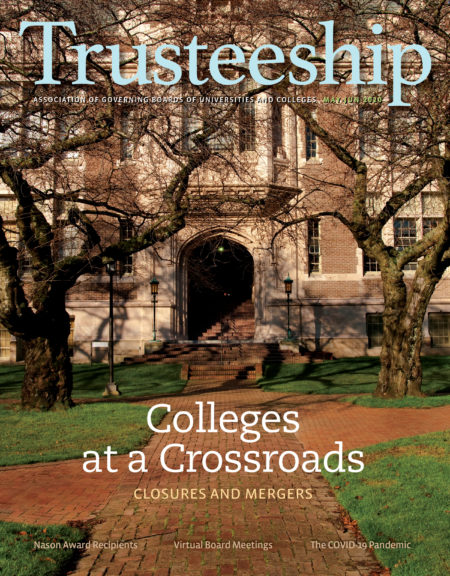
“Necessity is the mother of invention.”
Never before has this proverb from the Greek philosopher Plato been more pertinent.
While our higher education institutions were already navigating a trifecta of challenges—diminishing enrollments, increased public skepticism about the value of a college education, and low state funding—we now find ourselves in a dire new reality: adapt, innovate, or become obsolete.
Since the COVID-19 global pandemic brought a stop to life as we know it, AGB has been adapting to meet the needs of our more than 40,000 members and to help you navigate with knowledge and confidence. Many of you have asked—where do I start? What is the role of my board during this crisis?
Here are three recommended steps you can take now to promote favorable outcomes for your institutions, foundations, and communities:
1. Increase Communications: Establish frequent—potentially once or twice per week— communications between your board and president. You may need to include members of your executive team, faculty, or student body in these discussions, for shared governance is even more critical during crisis to both inform and gain input from key stakeholders. As many institutions are facing existential threats, strategic boards should work with their institution’s leadership teams to develop and prioritize action plans while exploring alternatives to set a sustainable path forward. As boards and leadership teams collaboratively refine their strategic plans within the context of the COVID-19 pandemic, regular communications with your institution’s stakeholders is also critical.
2. Oversee Rigorous Financial Analysis and Planning: The board’s finance and audit committee members should work with the president and finance team to review financial scenarios on a recurring basis. Boards should also oversee financial stress test results to better understand capital requirements that may be needed to support operations based on assumptions such as when your institution will announce summer and fall registration. As the board oversees the institution’s financial status, it is essential to assess cash balances and responsive access to credit. Further, explore cash shortfalls from revenue losses due to refunded or diminished tuition, room and board, and various fees and events, as well as from incremental expenses from new technology, staffing, and programming.
3. Reexamine Academic Quality and Admissions Through a Virtual Learning Lens: Given the accelerated shift to virtual learning, how will your institution need to change the methods and metrics by which academic quality is evaluated now and into the future? And how does this new environment align with the skills and workforce requirements that students need once they graduate? From an admissions perspective, how is your institution communicating with already accepted students and reassessing wait lists to build the fall class?
Within every crisis lies challenge and opportunity. Or, as our AGB Senior Consultant and National Conference on Trusteeship speaker Terrence MacTaggart put it in his session on crisis leadership: “Another opportunity to excel.” These unprecedented times present a unique opportunity for you to provide the strategic leadership that will define a new course for your institution. A strategic conversation between the president and board about lasting changes in modes of working, teaching, and learning may allow higher education to innovate and surge to new heights in the future.
To help you on this journey of navigating COVID-19 and its myriad implications, I hope you will turn to AGB’s Coronavirus Resource Center, engage with us in one of our widely attended webinars on the various facets of governing through this crisis, and read our newly released publications on risk management, enrollment management, crisis management, and top strategic issues.
In three short months, the turmoil of this pandemic has required us to act with unimagined speed, dwindling resources, and uncertain technology. But our shared response can achieve great progress if we take steps now to reimagine our opportunities and chart a new path for the future.
Since the founding of our country, institutions of higher education in the United States have contributed to the advancement of society. From the arts and humanities, to education and the sciences, the work of our colleges and universities has led to groundbreaking advancements. I am confident that in the years ahead, our presidents, boards, and institutions will once again lead the way in helping us overcome challenges.
The entire AGB team is here to help and to be your partner in this journey.

